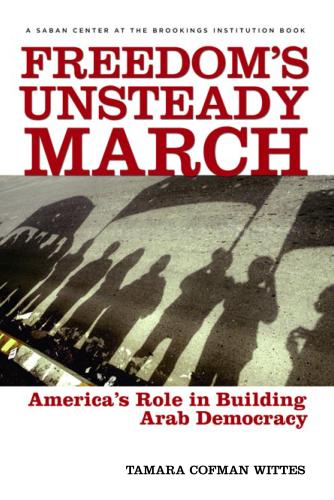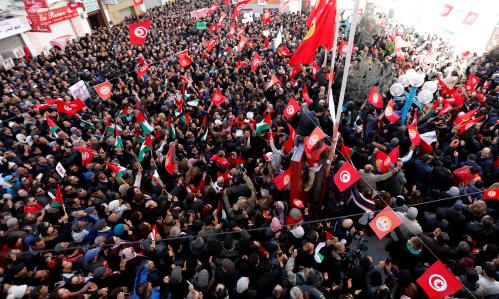On March 11, Algerian President Abdelaziz Bouteflika withdrew his candidacy for a fifth term as president, in response to three weeks of protests against his rule. He—or more accurately, his entourage—also sacked the prime minister and announced a national conference to revise the constitution. These concessions made headlines, with some initially comparing this “revolution” to the Arab Spring uprisings of 2011. But it has become increasingly clear that these maneuvers are not sincere reforms on the regime’s part, but rather a bid for time.
Bouteflika, 82, has been president of Algeria since 1999, when he was chosen as a consensus candidate to lead the country after its decade-long civil war. Bouteflika offered the rebels an amnesty, and to his credit allowed for a modicum of political opposition, albeit divided and weak. After suffering a stroke in 2013, however, Bouteflika has been unable to stand or speak, and has rarely been seen in public. In his stead, the regime is thought to be run by a shadowy cabal of military generals, businessmen, and figures close to the Bouteflika “clan,” including his brother and presidential advisor, Said. The regime—known as “le pouvoir” or “the power”—have been unable to agree on a consensus candidate to replace Bouteflika, and thus re-nominated him as president despite his nearly vegetative state.
Algerians, however—two-thirds of whom are under the age of 30—would not accept yet another term of a near-dead president. On February 22, protests began against Bouteflika’s candidacy, which had been announced 12 days prior. Protests steadily increased in size and scope, with hundreds of thousands of Algerians across the country taking to the streets each Friday since. While the primary and galvanizing demand had been “no to a fifth term,” chants have also called for the “fall of the entire system, not just Bouteflika.”
The regime’s first response was to try to scare off the demonstrators, reminding them of the traumatic civil war in the 1990s and the one raging in Syria today. After protesters were seen giving roses to the police, Prime Minister Ahmed Ouyahia warned on February 28 that “it’s beautiful, but I remember that in Syria, it started with the roses, too.”
As the protests continued to escalate, the regime began to offer concessions. On March 3, the regime promised that if Bouteflika wins the April 18 presidential elections, he would revise the constitution and organize early elections in which he would not participate. Skeptical, the protesters continued to demonstrate, leading to defections from the ruling party, the National Liberation Front (FLN). Moreover, the protests won endorsements even by groups affiliated with Algeria’s war of independence, on which the FLN bases its claim to rule.
After another Friday of mass protests on March 8, new cracks in the regime began to appear. The Deputy Defense Minister and Army Chief of Staff, Ahmed Gaid Salah, told a room of military cadets that “the people and the army share a common vision for the future,” a change of tone from his earlier threats to not allow the country to fall back into chaos and civil war.
One day later, the regime announced new concessions: Bouteflika would withdraw his candidacy for a fifth term, the government would be reshuffled, and the April 18 elections would be delayed until an “inclusive and independent” national conference revises the constitution.
But the Algerian people have seen through these concessions for what they really are: a bid for time. Delaying elections until a new constitution is written will have the effect of extending Bouteflika’s 4th term indefinitely. (It also puts Algeria in legal limbo when his 4th term constitutionally ends April 28.) Moreover, the “new” government simply recycles old names, elevating Interior Minister Noureddine Bedoui to prime minister and former Foreign Minister Ramtane Lamamra to deputy prime minister. And yet another regime-managed constitutional reform process—the country has already seen seven—will only serve to demobilize the protesters and allow the regime to live another day.
Many Algerians have therefore rejected these latest concessions. Protests have continued daily since the Monday evening announcement, albeit with new slogans. Protesters are now chanting against the extension of Bouteflika’s 4th term (or his “4.5th term”), reminding him that “leave means leave” (tarhalu ya’ani tarhalu). Djamila Bouhired, the iconic independence-era militant who has joined the protests, urged Algerian youth not to let the regime “steal your victory” with their “planned coup.” The country is bracing for yet another Friday of mass demonstrations.
Algeria’s protests are likely to continue until Bouteflika steps down, a government of national consensus is created, and a true transition to democracy is initiated. Getting there won’t be easy. It will require Algerians to continue protesting, to unite in their demands, and to remain peaceful in their demonstrations.
Some have instead called on the military to oust Bouteflika. While this may be a tempting, quick fix, history suggests it would complicate the subsequent transition. The military is already likely to be an obstacle to democratization, having terminated a previous attempt in 1992. Calling on it today to oust Bouteflika would give the military the opportunity to directly manage the transition and legitimate itself as the “savior of the revolution,” much like in Egypt in 2011. Algeria’s protesters should stick to what has worked for them thus far—unified, peaceful protests—and reject calls for a military intervention.
The Brookings Institution is committed to quality, independence, and impact.
We are supported by a diverse array of funders. In line with our values and policies, each Brookings publication represents the sole views of its author(s).







Commentary
Bouteflika’s bid for time
March 14, 2019